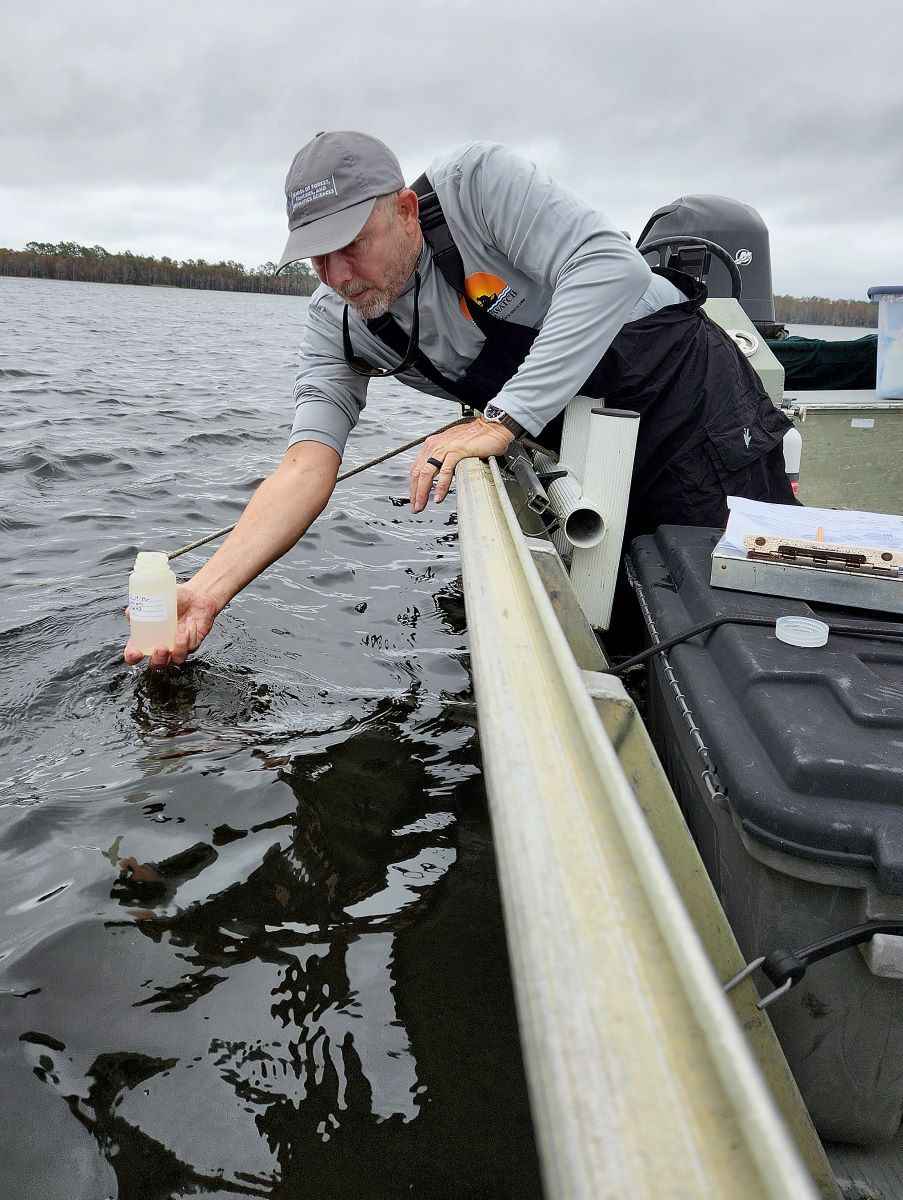UF’s Florida LAKEWATCH program saved State of Florida $5M in 2024
The University of Florida's Florida LAKEWATCH program saved the state an estimated $5 million in water quality monitoring, according to a 2024 annual report released in March.
Florida LAKEWATCH is a volunteer lake-monitoring program that facilitates hands-on participation in the management of Florida lakes, estuaries, rivers and springs through monthly monitoring activities.
The effort, which is coordinated through UF's Institute of Food and Agricultural Sciences and the School of Forest, Fisheries, and Geomatics Sciences, or SFFGS, has been in existence since 1986. In 1991, the Florida Legislature recognized the importance of the program and established Florida LAKEWATCH in the state statutes.
LAKEWATCH is now one of the largest lake-monitoring programs in the nation with an estimated 883 active volunteers currently monitoring 627 waterbodies in 47 Florida counties, including lakes, estuaries, river stations and springs.
“Long-term data sets such as LAKEWATCH’s database are invaluable for understanding how Florida’s lakes are changing over time as our state populations grow and urbanize.” —Michael Andreu, Ph.D., associate professor and extension coordinator, UF School of Forest, Fisheries, and Geomatics Sciences
Trained volunteers sample one of Florida’s many water bodies once a month for a minimum of two years. Samples are delivered to a collection center and then taken to the UF’s Fisheries and Aquatic Sciences water chemistry laboratory for analysis.
The information compiled from these samplings is used to create a long-term database that can serve as documentation of current water chemistry conditions -- to be compared with past and future water chemistry conditions.
“Long-term data sets such as LAKEWATCH’s database are invaluable for understanding how Florida’s lakes are changing over time as our state populations grow and urbanize,” said SFFGS extension coordinator and associate professor Michael Andreu, Ph.D.
The recently released “2024 UF/IFAS Florida LAKEWATCH Annual Report” was expanded to capture a broader look at Florida LAKEWATCH’s impact.
"In 2024, we began tracking some important numbers that have helped us better quantify and celebrate our volunteers' incredible work,” said Gretchen Lescord, Ph.D., an assistant professor at SFFGS and director of Florida LAKEWATCH.
“Some of it we had an idea of -- like the number of volunteers we have (883) and the number of waterbodies they monitor (627). But knowing that all that work resulted in an estimated $5M of savings in monitoring costs for the state of Florida in 2024 alone is very powerful.”

The savings estimate is based on Polk County extension agent’s estimate of $287 per sampling station per month times 12 months and times 1,722 stations across 627 active water bodies being sampled.
When external funding in the form of Department of Environmental Protection and county contracts plus analytical fees is computed, the total savings estimate for water analysis cost is over $5 million. Internal annual funding from UF/IFAS and SFFGS funding (which totals approximately $430,000 annually) was not subtracted from this cost estimate.
LAKEWATCH staff also tallied the number of other programs and extension agents that LAKEWATCH work supports and enables. The answer was 12 organizations across the state in 2024 and 13 agents, all of whom are valuable colleagues of the program.
“This shows the expanse of our impact and the impressive leadership of our volunteers,” Lescord said.
One such program known as SoUL (Stewards of Our Urban Lakes), is an award-winning nonprofit organization that manages urban ecosystems near St. Petersburg. It was founded and is led by LAKEWATCH volunteer Jim Bays.
“All of this is possible thanks to our funders, including the Florida Legislature and the Department of Environmental Protection, as well as UF/IFAS and SFFGS,” Lescord added.
The report also highlights that 26.9 percent of the 883 active volunteers have been with LAKEWATCH for more than 10 years.
“Many other citizen science programs really struggle with volunteer recruitment and retention. We are very fortunate to have such dedicated, hard-working volunteers that are interested in water quality in their backyards,” Lescord said.
In 2024, LAKEWATCH analyzed an estimated 61,692 samples and added 46,031 data points to the over 2 million data points in its database.
According to Lescord, “Such a comprehensive database allows scientists, policymakers, and conservationists to track changes in water quality over time and make informed decisions to protect and manage aquatic ecosystems. With so many volunteers and collaborators around the state, this really highlights a collaborative, long-term effort in environmental stewardship.”
Last year, as an extension effort, LAKEWATCH staff hosted 24 meetings across Florida that 533 Floridians attended.
Partners and collaborators with Florida LAKEWATCH include Choctawhatchee Basin Alliance, the Lake County Water Authority, Santa Fe Lake Dwellers Association, Friends of Lake Jackson, the Nature Coast Water Watch, the Bear Lake Preservation Association, the Friends of Lake Munsen, and Seminole Education, Restoration & Volunteer Program.
The data collected by LAKEWATCH was used in 3,082 waterbody reports, there were 20 external data shares across academia, government agencies and industries, and 46,031 data points were added to the DEP’s Watershed Information Network (WIN).
“Florida LAKEWATCH continues to set the bar in recruiting invested volunteers who take their role in water quality monitoring very seriously. These dedicated individuals expand our reach in collecting data, which is then used worldwide across academia, government, and industry,” said SFFGS Director Terrell T. “Red” Baker.
“Our school is committed to finding and delivering sustainable solutions that improve efficiency and productivity for partners and customers across private and public sectors at local to international scales.”
To learn more about Florida LAKEWATCH and read the full report, click here.
To see water chemistry repots organized by county and water type, click here.
